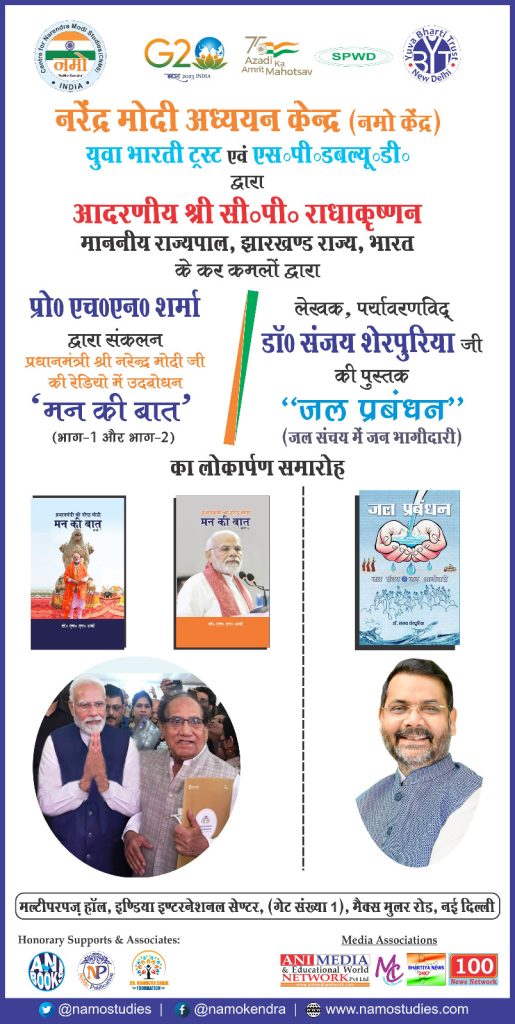Marking Former PM Chandrashekhar’s 96th birth anniversary, the Center for Narendra Modi Studies (CNMS) and Yuva Bharti Trust (YBT) & SPWD will organize the national seminar titled “G20 – Towards a Sustainable Habitat, Clean and Safe Water, is a Must”
The seminar aims to align the former PM’s growth model of Cooperative Movements and its relevance in today’s time.

Date: Monday, April 17, 2023
Event Title: “G20 – Towards a Sustainable Habitat, Clean and Safe Water, is a Must”
Venue: Multipurpose Hall, Gate No. 1,
India International Centre, 40, Max Muller Road, New Delhi
Time: 2:00pm to 4:00pm
Chief Guest: Honourable Governor of Jharkhand,
Shri C P Radhakrishnan Ji
Preside : Shri Ram Bahadur Rai, Chairman IGNCA, GoI
Speakers will be:
Prof Raghav Verma, Col Gautam Das Chairman SPWD, Dr. Sanjay Sherpuriya – noted Environmentalist, Shri P.S. Prasad, President, YBT Dr. HN Sharma, Sec, YBT & Professor Jasim Mohammad, Chairman CNMS, Aligarh
A brief details about the background of the concept and action with findings on
G20 – Towards a Sustainable Habitat, Clean and Safe Water, is a Must
Monday, April 17, 2023 I Multipurpose Hall, Kamladevi Complex, India International Center, 40, Max Muller Road, New Delhi 110003 at 2pm (Sharp)
The lack of access to clean and safe water coupled with the consumption of contaminated water is a severe health hazard for all lives on Earth. Unfortunately, due to unsustainable and indiscriminate use, about half of the world’s population is destined to live in water-scarce areas by 2025. By 2040, one in four children worldwide could live in extreme water stress areas. The World Resources Institute has identified 17 countries, including India, that are suffering from high baseline water stress.
Despite being crisscrossed by several rivers and receiving an average of over 1100 mm of rainfall annually, many cities in India have experienced “Day Zero” in recent years due to pilferage, leakage through outdated pipes and dripping taps, and failure to treat and reuse wastewater. This severe water crisis not only poses a health hazard but also leads to a loss of GDP. While much has been done in the last decade, more is required to be done to keep pace with India’s growth story.
In his Independence Day speech on August 15, 2019, Prime Minister Shri Narendra Modi Ji promised to take the Jal Jeevan Mission forward, stating, “in the next five years, we have to do more than four times the work that has been done in the last 70 years.” The government has indeed lived up to its promise, with the Prime Minister declaring on March 29, 2022, that more than six crore families across the country have received clean drinking water connections under this scheme in the last two and a half years.
As India continues to grow and become a manufacturing hub, access to water is crucial. To ensure sustainable use, there is a need to develop technology for maximum water recycling and proper treatment of effluents from domestic and industrial sources. Such goals require exploring all possible compact, green technologies that can be added to existing Sewage Treatment Plants (STPs) to achieve hundred per cent recyclability.
The task of cleaning water sources and effectively treating domestic and industrial effluents is enormous. For example, in Uttar Pradesh alone, more than 500 million litres of wastewater from untreated industrial sources containing harmful chemicals such as arsenic, chromium, lead, and mercury are being dumped into the Ganga per day. Recently, Contaminants of Emerging Concern and microplastics, resistant to conventional treatment methods, have also been found in the river. In addition, untreated domestic wastewater contains pathogens such as coliform, leading to antibiotic resistance in those who bathe in the river. Similar alarming situations exist with other rivers too.
Cleaning up water sources and increasing water reusability is a challenging task. However, it is necessary to ensure a sustainable habitat for all. Providing piped water to all households seemed to be a tall order, but the country is almost there. With the same spirit and vigour, cleaning up water sources and increasing water reusability must be undertaken on a war footing.





















